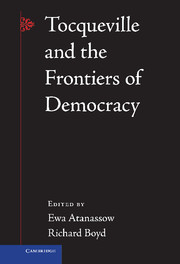Book contents
- Frontmatter
- Contents
- List of Contributors
- Short Title Abbreviations of Tocqueville's Major Works
- Acknowledgments
- Introduction: Tocqueville and the Frontiers of Democracy
- Part One The Meaning of Democracy and the Democratic Revolution
- 1 Democracy and Revolution in Tocqueville: The Frontiers of Democracy
- 2 The Frontier Between Aristocracy and Democracy
- 3 Tocqueville's Burke, or Story as History
- Part Two Democratization in a Non-Western Context
- Part Three Challenges of Globalization: Democracy, Markets, and Nationhood
- Part Four Democracy, Imperialism, and Foreign Policy
- Part Five Democracy's Old and New Frontiers
- Epilogue: New Frontiers, Old Dilemmas
- Bibliography of Works Cited
- Index
- References
1 - Democracy and Revolution in Tocqueville: The Frontiers of Democracy
Published online by Cambridge University Press: 05 April 2013
- Frontmatter
- Contents
- List of Contributors
- Short Title Abbreviations of Tocqueville's Major Works
- Acknowledgments
- Introduction: Tocqueville and the Frontiers of Democracy
- Part One The Meaning of Democracy and the Democratic Revolution
- 1 Democracy and Revolution in Tocqueville: The Frontiers of Democracy
- 2 The Frontier Between Aristocracy and Democracy
- 3 Tocqueville's Burke, or Story as History
- Part Two Democratization in a Non-Western Context
- Part Three Challenges of Globalization: Democracy, Markets, and Nationhood
- Part Four Democracy, Imperialism, and Foreign Policy
- Part Five Democracy's Old and New Frontiers
- Epilogue: New Frontiers, Old Dilemmas
- Bibliography of Works Cited
- Index
- References
Summary
Tocqueville does not speak of “frontiers of democracy.” So the use of this expression in reference to his work might appear arbitrary or even confusing. It seems to add the conceptual ambiguities of the notion of frontier, used in a metaphorical sense, to those of democracy. Yet it is possible to reverse this objection: the difficulties pertaining to the concept of frontier can focus our attention on an important aspect of Tocqueville's idea of democracy and help explore its complexity. This, I suggest, is precisely the case. Tocqueville's account of democracy is based on a necessarily revolutionary break with aristocracy. At the same time it reveals democracy's essential indeterminacy: Will the new democratic world be liberal, despotic, socialist? We all are, and we have to be, democrats, but we do not know exactly who we are. As democrats, we struggle against the aristocratic past but also against different understandings of the democratic present. This double conflict reveals the indeterminacy of democratic universalism. Democratic discourse is universal, but the actually existing democracy is often suspected of not being really universal.
The Idea of Frontier
How can the metaphor of the frontier illuminate this twofold struggle? In its most common and proper meaning, “frontier” signifies a dividing line between two countries. Beyond this line we have to speak another language, use a different currency; we cease to be citizens and become foreigners. The frontier delimits two territories and defines two identities, which are more or less modified when the frontier is displaced. The state of peace gives a kind of evidence to this line, which, when not contested, seems almost natural. Nevertheless, we know that this is not the case.
- Type
- Chapter
- Information
- Tocqueville and the Frontiers of Democracy , pp. 33 - 52Publisher: Cambridge University PressPrint publication year: 2013
References
- 5
- Cited by

